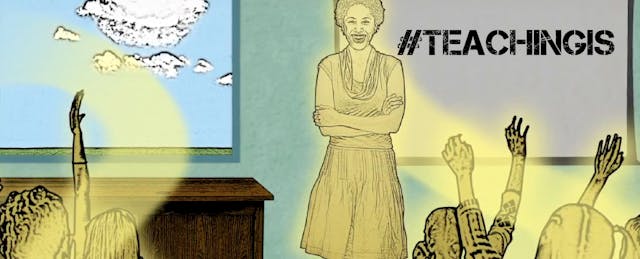Is it possible to change the perception of a profession one tweet at a time?
I certainly think so.
Earlier this year, my colleague Jaraux Washington and I were lamenting the fact that legislation affecting teachers is written without the input of those working in the profession. Even after 12 years of teaching, it’s still puzzling to me how policy and regulations that impact my profession are regularly crafted without any teacher’s input.
I don’t find myself quoting Matt Damon too often, but I thought he summed up this issue well in a Washington Post article: “We would never let businessmen design warheads. Why would you cut out educators when you’re designing education policy?”
He’s right (not to mention super adorable). Who knows more about teaching than teachers?
Surveys show time and again teachers are among the nation’s most trusted professionals. Despite this, politicians seem to believe that they know more about what students need than we do. This issue is complicated by negative stories about teachers that abound in the media and damage the perception of our profession: the teacher who inadvertently misspells a word on a homework assignment, or stories that reiterate the disparaging idiom "Those who can't, teach."
The underlying problem in all this is that teachers advocate for many things—except themselves and their profession. After all, most teachers don’t have time to craft Letters to the Editor or give testimony on Capitol Hill. Instead, they focus on their work and improving the quality of their instruction for students.
But teachers have rich stories to share. They have anecdotal evidence of the day-to-day challenges of their career. They have quotes, notes, and letters from students about how their teaching has affected them. They have pictures and videos that convey how complex their work is. They have evidence to convince the public that they are exactly the people who should be leading education reform.
So Jaraux and I asked ourselves: How can teachers change the public narrative about teaching in a way that doesn’t put one more responsibility on their plates?
The answer: Make it a part of what they’re already doing.
Like most people, one thing teachers do in their spare time is socialize. Most of what our friends and families know about our work already comes from their social interactions with us. Why not capitalize on those relationships and share the true story of what goes on in our classrooms? What would happen if we showed the world what teaching truly is…in our own words?
And what better way to give these stories a wide reach than via social media?
Thus the #TeachingIs social media campaign was born. This Teacher Appreciation Week (May 5-9), teachers and their supporters are encouraged to leverage the power of their social networks to share their stories and manifestos using Twitter, blog posts, Vine, Instagram, YouTube, graphics, six word memoirs, and more. All they have to do is use the hashtag #TeachingIs.
Jaraux and I are working with the Center for Teaching Quality to help promote this campaign. We’ve been able to use technology in some neat ways to spread our message. For example, we created a Thunderclap, which allows people to donate a Facebook post or Tweet to promote the campaign. We also used Google Drive to create a partner packet with images, avatars, and sample messaging for organizations or individuals to use. Hundreds of teachers have already submitted content using the #TeachingIs hashtag—so even though the campaign hasn’t officially begun yet, I still think it’s a success.


Teachers are sharing their stories of what #TeachingIs—won’t you add your voice? Join our social media movement!


